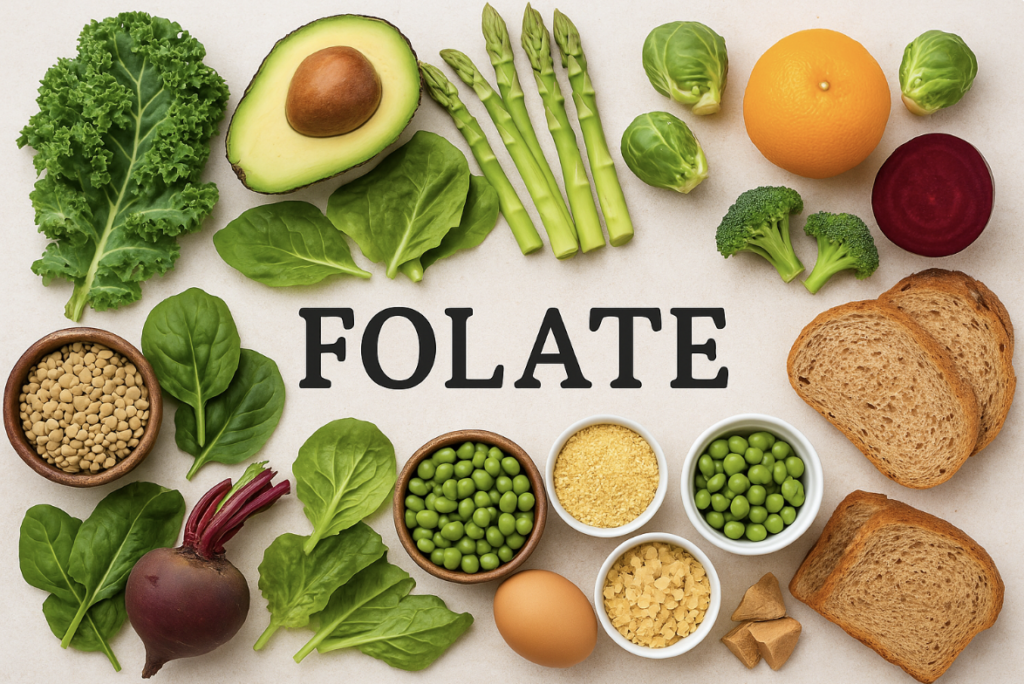Folate—also known as vitamin B9—is a water-soluble B vitamin that plays a major role in DNA synthesis, red blood cell production, and fetal development. It’s especially important during pregnancy, but it supports energy, brain health, and cardiovascular function in all stages of life. In this post, you’ll discover how folate benefits your body, the difference between folate and folic acid, signs of deficiency, top food sources, and tips for getting enough every day.
What Does Folate Do in the Body?
Folate helps your cells grow, divide, and repair themselves. It’s vital for creating DNA and RNA, and it works alongside other B vitamins to support metabolism and nervous system health.
✔ Key Functions of Folate:
- Supports red blood cell formation and prevents anemia
- Assists in DNA and RNA synthesis
- Supports fetal neural tube development in early pregnancy
- Helps convert homocysteine to methionine (heart-protective)
- Aids in mood regulation and brain function
💡 Did You Know? Low folate can raise homocysteine levels, which may increase the risk of heart disease and stroke.
Top Health Benefits of Folate

✔ 1. Supports Pregnancy and Prevents Birth Defects
Adequate folate is critical for proper neural tube closure and spinal cord development in early pregnancy.
✔ 2. Prevents Megaloblastic Anemia
Folate helps create healthy red blood cells—deficiency can lead to oversized, dysfunctional cells.
✔ 3. Promotes Brain Health and Mood Stability
Folate supports neurotransmitter balance and cognitive function. Low levels are linked to depression.
✔ 4. May Lower Risk of Heart Disease
By helping break down homocysteine, folate may reduce cardiovascular risk.
✔ 5. Supports Detoxification and Cell Repair
Folate plays a role in methylation—a key detox and repair process in the body.
Signs of Folate Deficiency

⚠️ Common Symptoms:
- Fatigue or weakness
- Pale skin and shortness of breath
- Irritability or mood swings
- Poor concentration or memory lapses
- Mouth sores or swollen tongue
💡 At-Risk Groups:
- Pregnant or breastfeeding women
- People with malabsorption disorders (e.g., celiac, Crohn’s)
- Chronic alcohol users
- Individuals on certain medications (e.g., methotrexate, anticonvulsants)
Best Food Sources of Folate

🥬 Folate-Rich Foods (Naturally Occurring):
- Leafy greens (spinach, kale, romaine)
- Asparagus and Brussels sprouts
- Avocados and oranges
- Beans, peas, and lentils
- Beets and broccoli
🌾 Fortified Foods (Folic Acid):
- Enriched breads, cereals, and pasta
- Nutritional yeast
💡 Tip: Steam or lightly sauté greens—overcooking can destroy folate.
Folate vs. Folic Acid: What’s the Difference?
- Folate: Naturally occurring in foods; easier for most people to regulate in the body
- Folic Acid: Synthetic form used in supplements and fortification; needs to be converted by the liver
💡 People with the MTHFR gene variant may have trouble converting folic acid into active folate (L-methylfolate).
Recommended Daily Intake (RDI)
- Adults: 400 mcg DFE/day
- Pregnant women: 600 mcg DFE/day
- Breastfeeding women: 500 mcg DFE/day
💡 DFE = Dietary Folate Equivalents, which account for differences between food folate and synthetic folic acid.
Folate Supplement Considerations
💊 Best Forms to Supplement:
- L-methylfolate (bioactive form, especially for those with MTHFR variants)
- Folic acid (common in multivitamins and prenatal supplements)
⚠️ Too Much Folate?
Excess folic acid (above 1,000 mcg/day) may mask vitamin B12 deficiency and cause neurological complications.
Pros and Cons of Folate
✔ Pros:
- Essential for pregnancy, brain health, and cell repair
- Found in a wide range of plant-based foods
- Fortified foods help prevent widespread deficiency
⚠️ Cons:
- Synthetic folic acid may not be well-processed in all individuals
- Cooking and processing can destroy folate
- Supplementing without testing may mask other nutrient deficiencies
Folate is more than just a pregnancy vitamin—it’s a critical nutrient for every cell in your body. By including leafy greens, legumes, and fortified grains in your diet, you can ensure optimal intake for energy, mental clarity, and long-term health. Choose active forms like L-methylfolate if supplementing, and always talk to your doctor before starting high-dose folic acid.
Read more on vitamin A for vision and immunity
Learn more about folate from the National Institutes of Health
